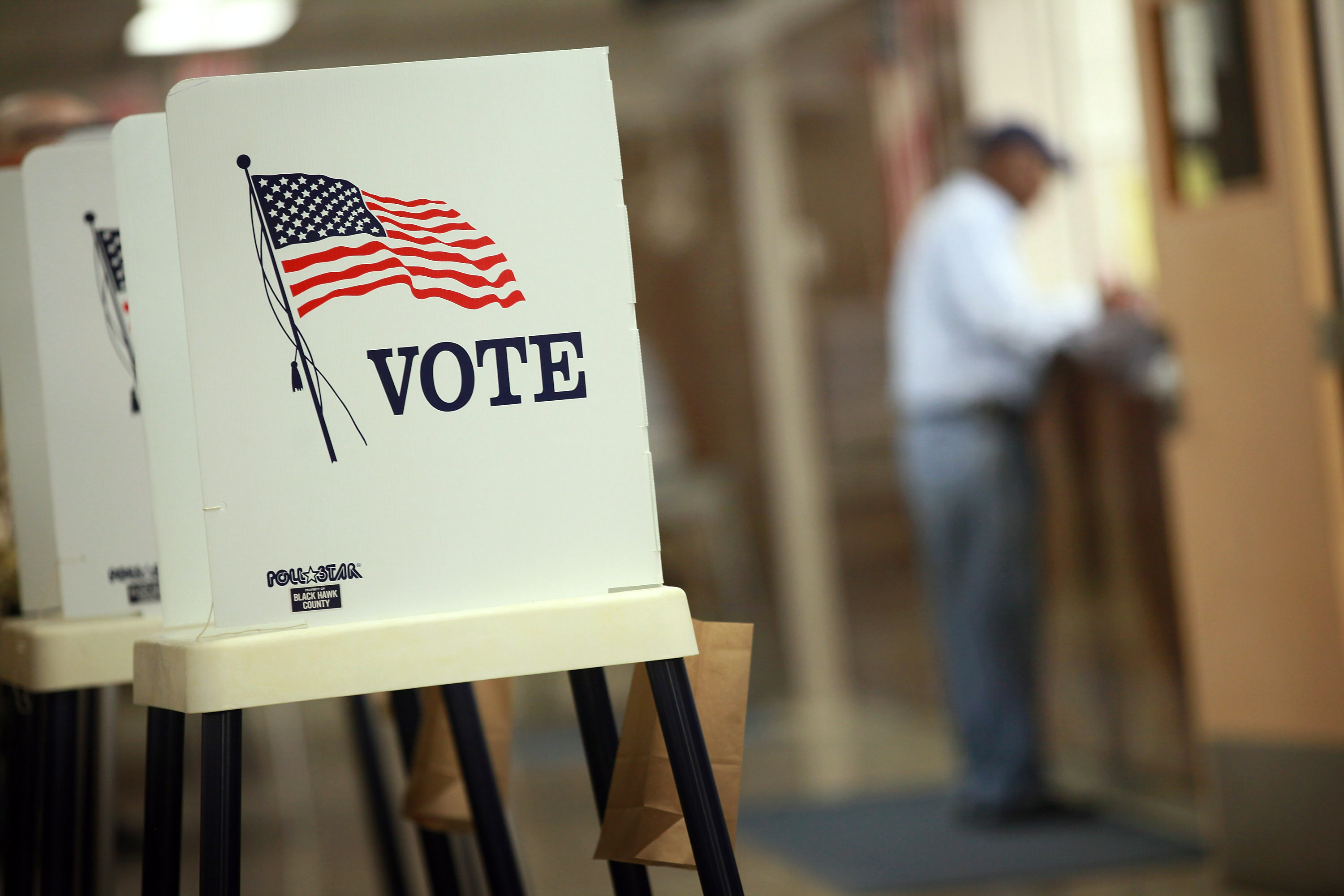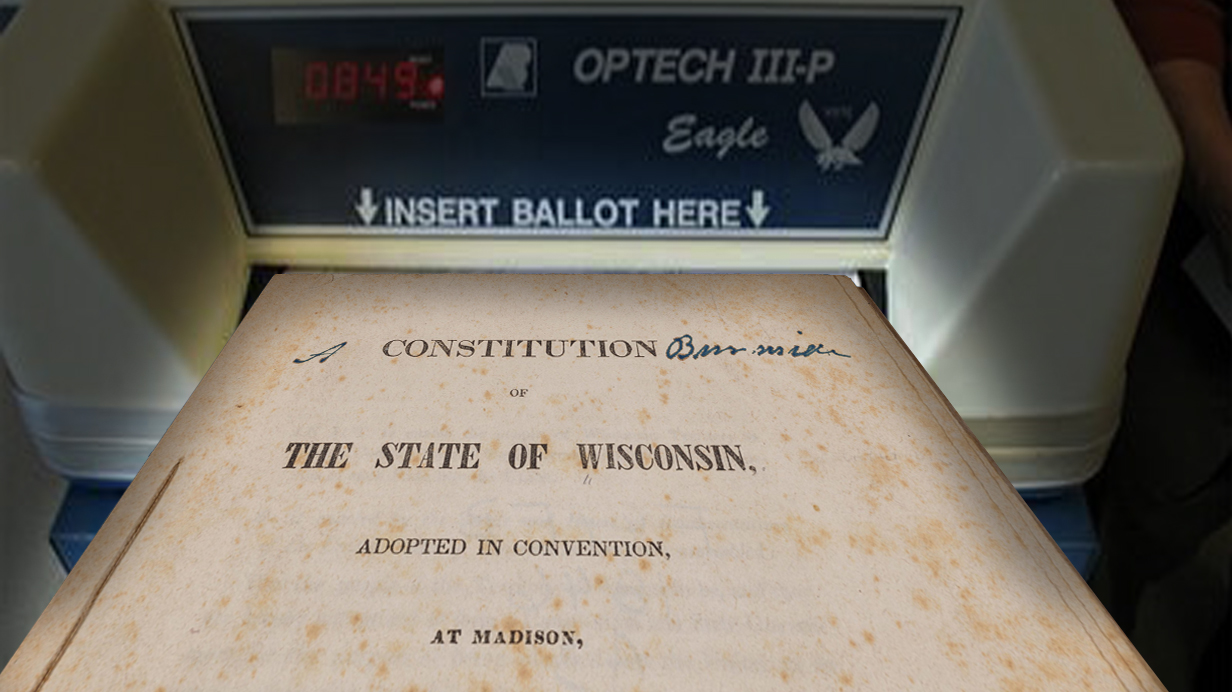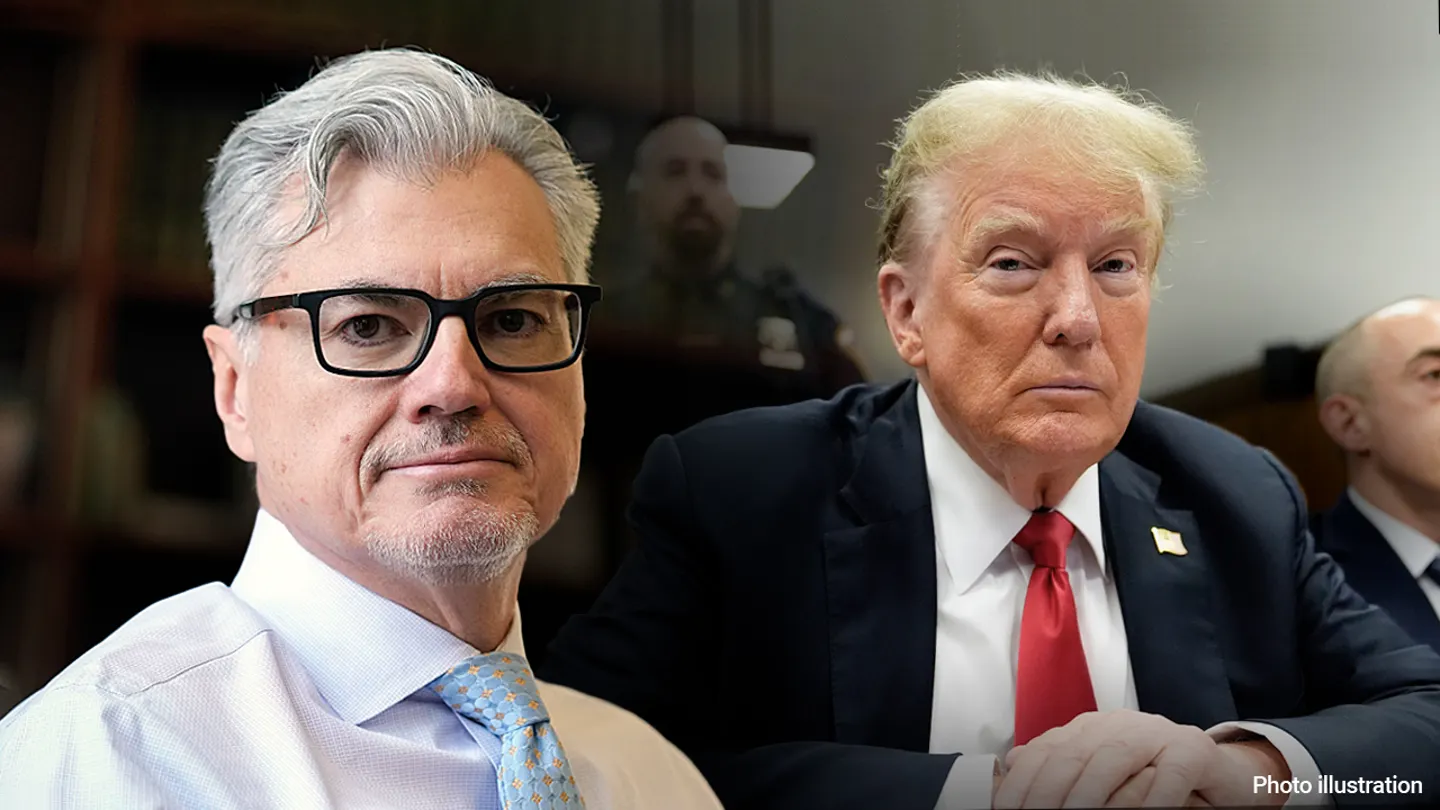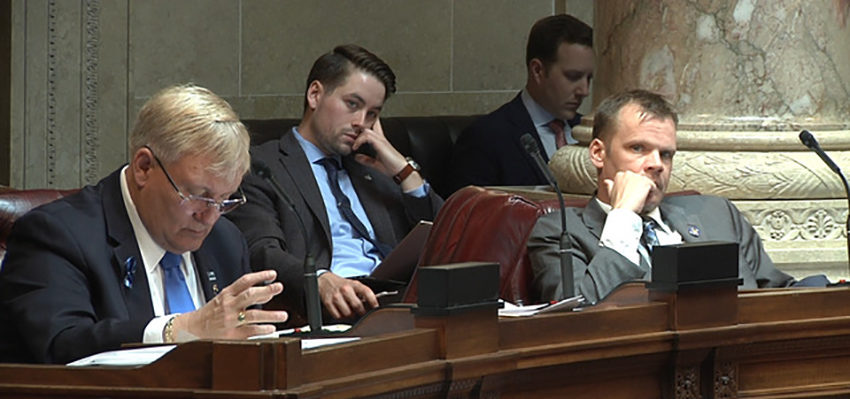 [bctt tweet=”While the final bill is a product of divided government, most Senate Republicans agreed the budget funds Wisconsin’s top priorities while spending less than Evers’ plan and delivering more tax relief. #wiright #wipolitics #wibudget ” username=”MacIverWisc”]
[bctt tweet=”While the final bill is a product of divided government, most Senate Republicans agreed the budget funds Wisconsin’s top priorities while spending less than Evers’ plan and delivering more tax relief. #wiright #wipolitics #wibudget ” username=”MacIverWisc”]
MacIver News Service | June 26, 2019
By M.D. Kittle
MADISON, Wis. — Different day, same result.
The Republican-controlled Senate passed the $83.6 billion biennial budget Wednesday, a day after their colleagues in the Assembly did the same.
But the Senate vote came in a lot narrower and the language from the left a bit more strident in the Democrats’ last legislative gasp to convince the Republican majority to spend even more money.
Democratic Gov. Tony Evers now gets a crack at a budget the GOP-led Joint Finance Committee basically built from scratch. Evers remained tight-lipped on whether he would veto the entire document, even as some senators in his party were more than hinting he should do so.
“I’ve said all along that the will of the people is the law of the land, and that’s what will be in my mind as I review the Legislature’s changes to our budget,” the governor tweeted following the Senate’s 17-16 vote.
I’ve said all along that the will of the people is the law of the land, and that’s what will be on my mind as I review the Legislature’s changes to our budget.
— Governor Tony Evers (@GovEvers) June 26, 2019
Following through on their previous pledge, Sens. Dave Craig (R-Big Bend) and Steve Nass (R-Whitewater) voted with all 14 Senate Democrats and against the spending plan. The fiscal hawks, like their liberal colleagues, were appalled by the level of spending in the Republican package — but certainly not for the same reasons.
Nass said Evers’ original two-year budget plan, weighing in at north of $86.2 billion, was the “most horrible document offered” of the 15 budgets he has voted on in his long legislative tenure.
Nass said Evers’ original two-year budget plan, weighing in at north of $86.2 billion, was the “most horrible document offered” of the 15 budgets he has voted on in his long legislative tenure.
“That being said, my Republican colleagues have unfortunately crafted a budget document filled with excessive and unsustainable spending levels,” the senator said in a statement. “It is a budget developed based on spin and fails to live up to our conservative fiscal principles that had been the hallmark of Wisconsin Republicans since 2011.”
Craig said the hefty spending and the expansion of government in the Republican budget made an affirmative vote impossible for him.
“If you’ve grown government and not passed substantial reforms that lead to smaller government, that’s a budget that I’ve told my constituents time and time again that I’m going to vote against,” Craig said.
The senators also said the Republican plan brings an alarming shortfall into the next budget cycle. The proposal comes with a $1.4 billion structural shortfall. Evers’ budget plan posts a nearly $2 billion deficit.
But while the final bill is a product of divided government, most Senate Republicans agreed that the budget funds Wisconsin’s top priorities while spending less than Evers’ plan and delivering another round of tax relief.
Senate Majority Leader Scott Fitzgerald said the budget keeps Wisconsin moving in the right direction.
“When compared to what was introduced by the governor, our budget spends $2 billion less, borrows $500 million less, and taxes hard-working families over $1 billion less,” the Juneau Republican said in a statement. “On top of that, we deliver over $500 million in tax cuts.”
Republicans note that Evers’ budget proposal, while providing $833 million in tax cuts, reduces the tax burden for some by raising taxes for manufacturers and retirees.
Drafted and passed earlier this month by the GOP-led Joint Finance Committee (JFC), the GOP plan comes with a whopping $81.67 billion in all-funds spending, plus $1.91 billion in bonding authorization for state capital projects, for a grand total of $83.58 billion for the biennium. Evers’ tally in all-funds spending hits $83.8 billion, with another $2.44 billion in bonding — for a total of $86.2 billion.
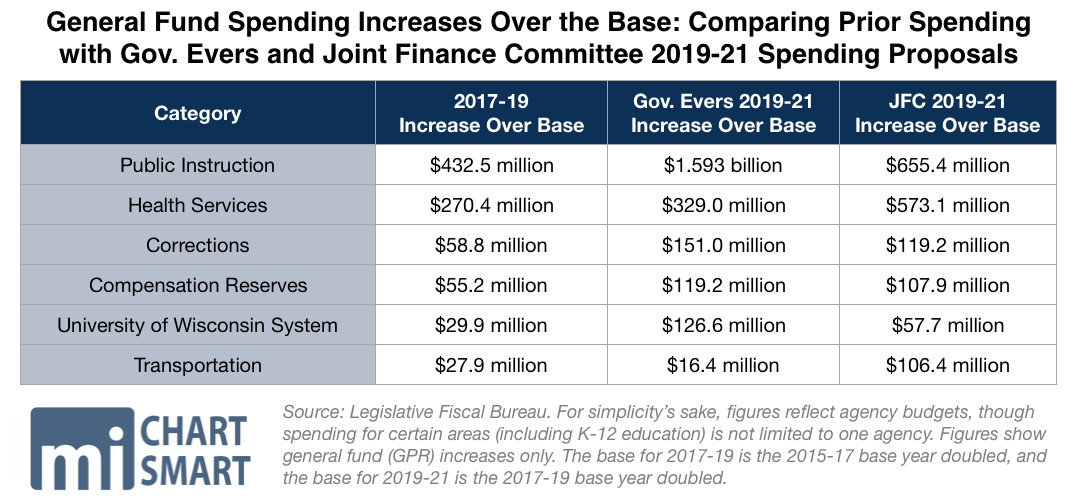
The GOP plan provides $655.4 billion more in General Purpose Revenue over the budget base to the state Department of Public Instruction (DPI), making it the largest general fund increase in sheer dollars. All told, the two-year DPI budget spends north of $15.2 billion on K-12 education.
It pumps hundreds of millions of dollars more into transportation, and $1.9 billion in borrowing for state building projects. And the budget significantly boosts Medical Assistance spending, and provides more money for nursing homes, home care and direct care workers and state prosecutors.
“From historic investments in K-12 education, targeted investments in health care, fixing our roads, and continuing to protect taxpayers, the Wisconsin budget is responsible and sustainable. It protects our shared values and moves our state forward,” Joint Finance Committee co-chairs, Sen. Alberta Darling (R-River Hills) and Rep. John Nygren (R-Marinette) said in a statement. The lawmakers warned Evers that vetoing the bill in its entirety “would have dire consequences for the millions of people throughout our state.”
While the Republican budget spends $7 billion (all funds and bonding) more than the 2017-19 spending plan that Walker signed into law, it is still not enough for Democrats.
While the Republican budget spends $7 billion (all funds and bonding) more than the 2017-19 spending plan that Walker signed into law, it is still not enough for Democrats.
The minority party pushed seven separate amendments Wednesday, calling for Evers’ level spending on everything from climate change and environmental initiatives to hundreds of millions more in education and health care.
Their No. 1 amendment, though, was an attempt to restore Evers’ cornerstone budget proposal: Requiring Wisconsin accept federal Medicaid expansion money. Acknowledging what has been abundantly clear since Evers introduced his budget plan four months ago, the “free” Medicaid money is the foundation for everything in the governor’s blueprint.
Senate Democrats ridiculed Republicans for passing up $3 billion in federal funding over the five-year run of the Medicaid expansion through Obamacare. Sen. Jon Erpenbach (D-West Point), called Republicans’ refusal to take the money “stupid.” And Sen. Lena Taylor, an African-American Democrat from Milwaukee, once again played the political race card.
“Is that it, that you’re not concerned about the babies if they look like me,” Taylor said, insisting that GOP senators are letting black children die because they don’t support Medicaid expansion and they won’t spend as much as Evers on lead abatement programs. “How do you go to sleep at night when you know what you’re doing is going to cause more deaths.”
Sen. Lena Taylor – again – shoves race into budget debate. "Is that it, that you’re not concerned about the babies if you look like me?" She insists GOP senators are letting African-American children die because they don't support Medicaid expansion. #wright #wibudget #wipolitics
— MacIver Institute (@MacIverWisc) June 26, 2019
Medicaid expansion, Republicans argued, would be costly to the private insurance market, pushing up premiums and limiting access and affordability. It also would expand welfare in a time of unprecedented economic growth. Besides, majority members said, their budget delivers substantial increases in health care and medical assistance funding without using money from a debt-ridden federal government that has failed to keep funding promises to states.
On Tuesday, the Republican-led Assembly passed the same budget bill, which included an amendment that seemed to offer enough sweeteners to ensure final passage.
One controversial provision and allegations surrounding it led a senator to call a press conference in defense of his integrity.
The measure opens the door for the sale of Tesla vehicles in Wisconsin, something that is restricted under current state law. The proposal reportedly was aimed at Sen. Chris Kapenga (R-Delafield). Kapenga has long supported the Tesla legislation. A Milwaukee Journal Sentinel story Tuesday claimed Kapenga owns Integrity Motorsports of Eagle, a retailer of Tesla parts.
At the emotional press conference just minutes before the Senate began debate on the budget, Kapenga blasted the story as false. He said he owns a website, not a dealership. He said he helped his daughter build the website as a learning experience. Rebuilding Tesla vehicles is a hobby, not a business, the senator said, although he acknowledged he has sold Tesla parts to the solar industry.
.@SenatorKapenga explained in a press conference minutes ago why he now a firm yes vote on the budget. #wipolitics #wibudget pic.twitter.com/qkzTcKnzPS
— MacIver Institute (@MacIverWisc) June 26, 2019
Kapenga claims special interests looking to kill the Tesla bill fed the press false information in an “attempt to discredit myself and Tesla, which is a great company.”
“I feel like it brought my character into question,” the senator said.
While he said he agonized over how he would vote on the budget, he said Wednesday morning that he was a definite “yes.” He said he arrived at his decision in large part because of the tax relief the budget delivers. And as a free-market advocate Kapenga said he remains committed to a bill that would open Tesla sales in Wisconsin.
Kapenga, a fiscal conservative, was closely watched as a possible no vote, which would have sunk the Republican budget. As it turned out, he was the deciding vote in favor of the bill.
“While I had concerns with the overall levels of spending in the budget, we also have to recognize that Scott Walker is no longer the Governor. With that being said, there are a number of positives in this budget that we should be proud of,” the senator said in a statement.
He likes the $450 million in income tax relief the budget provides, and that the spending plan doesn’t expand welfare or raise taxes — except on vaping products and little cigars.
“This budget nearly doubles the rainy day fund, ensuring that the state will be well insulated should another recession occur in the near future,” Kapenga added.
